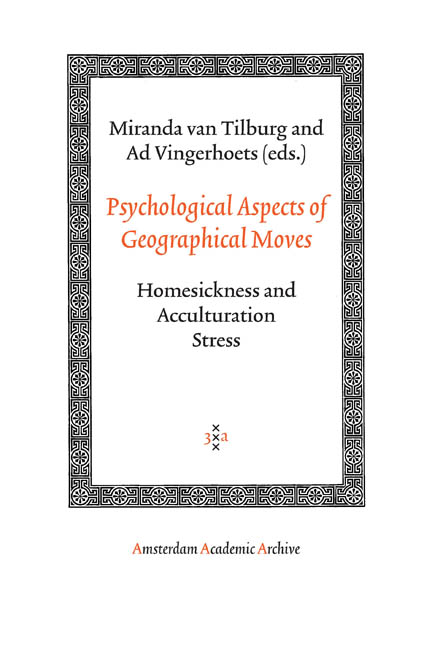Book contents
- Frontmatter
- Preface
- Contents
- Contributors
- 1 The Homesickness Concept: Questions and Doubts
- 2 Culture Shock, Homesickness, and Adaptation to a Foreign Culture
- 3 The Psychological Context of Homesickness
- 4 Geographical Moves and Psychological Adjustment
- 5 Homesickness and Acculturation Stress in the International Student
- 6 Psychological and Psychosocial Adjustment of Migrants: Families in a Changing Environment
- 7 Individual Differences in Acculturative Stress Reactions: Determinants of Homesickness and Psychosocial Maladjustment
- 8 The Cry for the Lost Placenta: Cultural Bereavement and Cultural Survival among Cambodians who Resettled, were Repatriated, or Stayed at Home
- 9 Children's Coping with Homesickness: Phenomenology and Intervention
- 10 Homesickness after Relocation during Early Adolescence
- 11 Personality, Temperament, and Homesickness
- 12 Homesickness, Personality and Personality Disorders: An Overview and Therapeutic Considerations
- 13 Health Issues in International Tourism: The Role of Health Behavior, Stress and Adaptation
- 14 Development of Psychopathology in International Tourists
- Miscellaneous Endmatter
10 - Homesickness after Relocation during Early Adolescence
Published online by Cambridge University Press: 23 January 2021
- Frontmatter
- Preface
- Contents
- Contributors
- 1 The Homesickness Concept: Questions and Doubts
- 2 Culture Shock, Homesickness, and Adaptation to a Foreign Culture
- 3 The Psychological Context of Homesickness
- 4 Geographical Moves and Psychological Adjustment
- 5 Homesickness and Acculturation Stress in the International Student
- 6 Psychological and Psychosocial Adjustment of Migrants: Families in a Changing Environment
- 7 Individual Differences in Acculturative Stress Reactions: Determinants of Homesickness and Psychosocial Maladjustment
- 8 The Cry for the Lost Placenta: Cultural Bereavement and Cultural Survival among Cambodians who Resettled, were Repatriated, or Stayed at Home
- 9 Children's Coping with Homesickness: Phenomenology and Intervention
- 10 Homesickness after Relocation during Early Adolescence
- 11 Personality, Temperament, and Homesickness
- 12 Homesickness, Personality and Personality Disorders: An Overview and Therapeutic Considerations
- 13 Health Issues in International Tourism: The Role of Health Behavior, Stress and Adaptation
- 14 Development of Psychopathology in International Tourists
- Miscellaneous Endmatter
Summary
Homesickness after relocation during early adolescence
The early adolescent years (11-14 years of age) are notable for major biological, cognitive, and social transitions. Relocation to a new community during this period creates an additional set of demands for the adolescent and his or her family, yet research on the ways relocation may influence adolescent development remains sparse. Conceptual models of homesickness potentially contribute to a clearer understanding of possible effects of relocation during early adolescence. This chapter applies these conceptual models within the context of major developmental features of early adolescence.
Three propositions organize this effort. First, homesickness models may provide needed guidance for future research on relocation. Second, currently available research on relocation in early adolescence may be profitably reformulated in terms of homesickness models. Third, developmental features of early adolescence must be considered in research on homesickness after relocation during this age.
Defining homesickness in early adolescence
Adopting the general definition of homesickness as a complex cognitivemotivational state primarily centered on missing family, friends, and physical aspects of the home environment (Fisher & Hood, 1988), it becomes necessary to specify how this state is likely to be expressed in early adolescence after relocation to a new community. In describing this complex state, it seems useful to consider expressions of homesickness in multiple domains, including behavioral, somatic, cognitive, and affective (Van Tilburg et al., 1996). Before considering domain-specific expressions, however, it is necessary to address the issue of whether, how often, and for how long issues related to missing people or other aspects of the previous environment are significant concerns among teenagers who have relocated.
Research on this issue is very sparse. The limited evidence available suggests that some, but not all, adolescents note missing friends or other people from the previous community as a worry or concern after relocation. Our research with a sample of 71 recently relocated 12- to 14-year-old adolescents found that 25% noted concerns or difficulties related to leaving friends or relatives about three months after relocating, but only 2% reported missing familiar settings (Abwender et al., 1991). Making new friends was a concern for 55% of the adolescents, suggesting some dissatisfaction with their friendship networks in the first few months after relocating.
- Type
- Chapter
- Information
- Psychological Aspects of Geographical MovesHomesickness and Acculturation Stress, pp. 147 - 160Publisher: Amsterdam University PressPrint publication year: 2006

